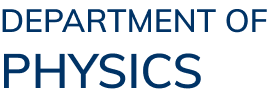Abstract
Many of the gravitational-wave signals detected by the LIGO-Virgo-KAGRA detectors end with exponentially decaying waves emitted by the remnant black holes formed by the corresponding binary black-hole coalescence. The frequencies and lifetimes of these decaying waves are called quasinormal mode frequencies, and they are closely related to the dynamics of the spacetime near the horizon of the remnant black hole. In this connection, detecting black-hole quasinormal modes is a powerful probe into the nature of gravity. However, the challenge of computing quasinormal mode frequencies has meant that quasinormal-mode tests of general relativity have remained largely statistical and model-independent. In this talk, the speaker will introduce Metric pErTuRbations wIth speCtral methodS (METRICS) [1], a novel spectral code capable of accurately computing the quasinormal mode frequencies of black holes, including those with modifications beyond Einstein's theory or the presence of matter. The speaker will demonstrate METRICS' accuracy in calculating quasinormal mode frequencies within general relativity as a validation. Then, he will show the results of the first accurate computations of the quasinormal-mode frequencies of rapidly rotating black holes in Einstein-scalar-Gauss-Bonnet gravity [2, 3] and dynamical Chern-Simons gravity. Finally, the speaker will discuss how the METRICS frequencies can be used to test different gravity theories by analyzing gravitational waves.
[1]: Phys. Rev. D 109, 044072 (2024)
[2]: Phys. Rev. Lett. 133, 181401 (2024)
[3]: Phys. Rev. D 110, 064019 (2024)
Dr. Adrian Ka-Wai Chung is a postdoc research associate in Prof. Nicolas YUNES's group at the University of Illinois Urbana-Champaign (UIUC) and a member of the Illinois Center for Advanced Studies of the Universe (ICASU). He completed his Bachelor of Science (2013-2017) and Master of Philosophy (2017-2019) degrees at The Chinese University of Hong Kong. In 2022, Dr. Chung earned his PhD in Physics from King’s College London, with the support of the Hong Kong Scholarship for Excellence Scheme awarded by the Hong Kong Government. His research interests include testing general relativity and search for dark matter through gravitational-wave detection, black-hole ringdown phase, lensing of gravitational waves, and stochastic background. From 2016 to 2022, Dr. Chung was a member of the LIGO-Virgo-KAGRA collaboration and participated in actual data analysis for testing general relativity. Now, Dr. Chung is a member of the LISA consortium.
For more information regarding this program, please visit https://ias.hkust.edu.hk/events/gravitational-wave-tests-of-general-relativity-with-metrics.
